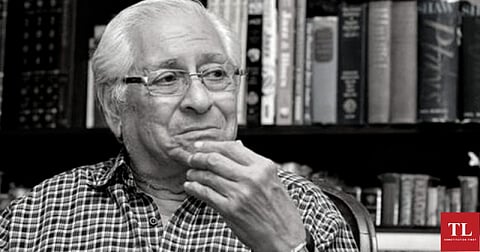

Soli Sorabjee, Senior Advocate and former Attorney General of India passed away on 30th April 2021. Sorabjee's passing marks the end of an era. Sorabjee was a staunch advocate of free speech and civil rights. In this article, Senior Advocate ASHOK KUMAR PANDA pays tribute to his former senior and guru.
—–
In the passing away of Soli Sorabjee on 30th April 2021, the country lost its conscience keeper and a crusader for the rights of the common man. When his family members and friends were celebrating Soli's 91st birthday on 9th March this year at the India International Centre, no one could imagine that we would so soon be losing our Doyen of the Bar. The celebration was enlightened with a lively interaction with the Guest of Honour, Justice Rohinton F. Nariman.
In my frequent meetings with him in the dining hall of the India International Centre, it was beyond my dream that we should be losing our ideal hero so soon to the cruel hands of Covid-19.
Just about three months before, on 2nd February, it was my good fortune to have Soli release my book, 'Institutions that Shaped Modern India: Supreme Court', in the same hall of the India International Centre. Soli was gracious to write his foreword for my book published by Rupa. All the time, I imagined that Soli would be with us for a long time to come.
My association with Soli began when he was kind enough to accept me as his junior and my association with him was intertwined with my association with Justice V M Tarkunde. I looked upon both the giants of our bar as my guide throughout my career, in law as well as in the human rights movement.
Soli to me was a noble soul who devoted seven decades of his legal career in the service of our country. Soli was born on 9th March 1930 at Bombay into an established Parsi business family who owned considerable wealth in Mumbai. His was a life of opportunities and privilege. In spite of his opulent background, Soli did not choose a life of ease and opted for a career in law which to him was a calling and not a business.
After his graduation in Economics, he joined the Government Law College, Mumbai, for his legal education. Amongst his contemporaries in the law college were, Fali S Nariman, Anil B Divan, Ashok Desai and Murli C Bhandare who subsequently became legal luminaries in the Supreme Court.
Soli and his contemporaries were fortunate to have Nani Palkhivala and Chief Justice Y V Chandrachud as their distinguished teachers in the law college who shaped their grounding in the field of law and jurisprudence.
Soli joined the chambers of Sir Jamshedji Kanga in June 1953 and worked under the tutelage of Kharsedji Bhabha. Nariman was about two years senior to him in the profession and thus began their journey in law.
At a very young age, Soli attained excellence and recognition in the legal profession especially on the Original Side of the Bombay High Court.
The Bombay High Court under the Chief Justiceship of M. C. Chagla was a defender of civil liberties of the common man in the 1950s and Soli had ample opportunities to excel in championing the cause of the common man especially the minorities.
In 1967, Soli got the first opportunity of arguing before the Constitution Bench of the Supreme Court presided over by one of India's great judges, Justice K Subba Rao, in a case pertaining to the validity of the old Passports Act, 1920.
After his debut success, Soli didn't look back and participated in most of the cases involving constitutional issues before the Supreme Court.
He became an essential part of the legal team of Nani Palkhivala in landmark cases of I C Golaknath as well as Keshavananda Bharti. In Keshavananda Bharti, Supreme Court came out with the doctrine of basic structure. A 13-member bench of the Supreme Court enunciated that the Legislature did not have the amending power to change the basic features of the Constitution. Thus, democratic institutions have been safeguarded from onslaughts from the authoritarian regimes in future.
Soli was appointed Attorney General for the country twice, in 1989 – 1991 and 1998 – 2004, and while occupying the high constitutional office he has always upheld its dignity by standing up to the powers that be.
Apart from law, Soli's multi-faceted personality is widely known for his passion for Jazz and its promotion in the capital city.
Soli might have passed onto a world beyond but has left us precious treasures to celebrate his life. His passion for justice and prolific writings on jurisprudential issues would always remain a guide for our democratic institutions and future generations.
(Ashok Kumar Panda is a Senior Advocate at the Supreme Court of India. He is also the author of 'Institutions that Shaped Modern India: Supreme Court.' The views expressed are personal.)